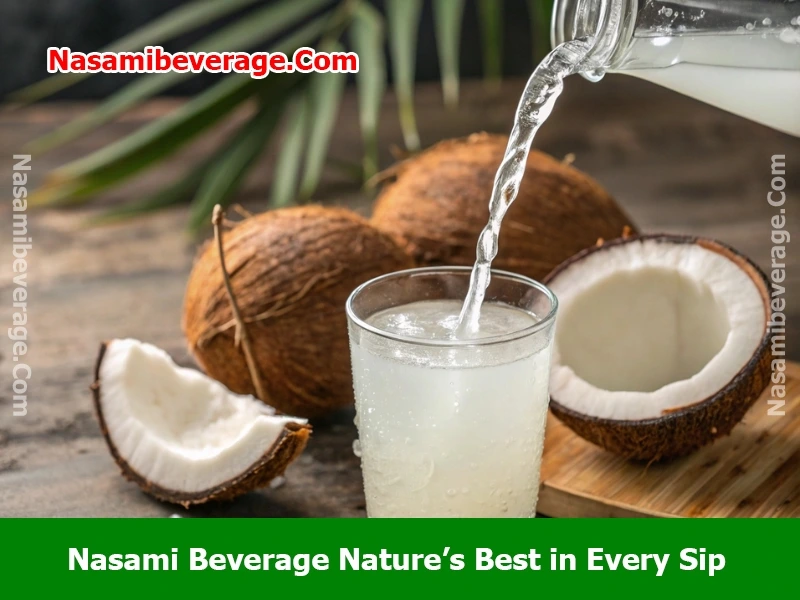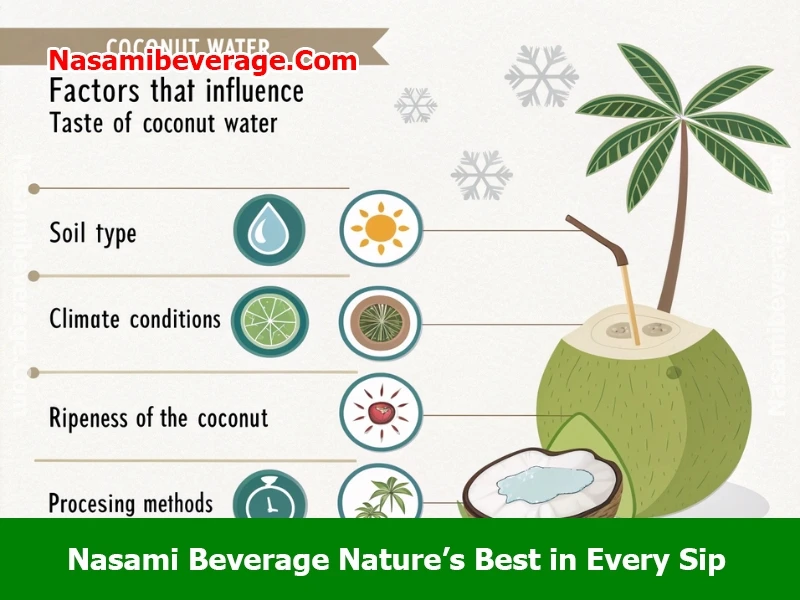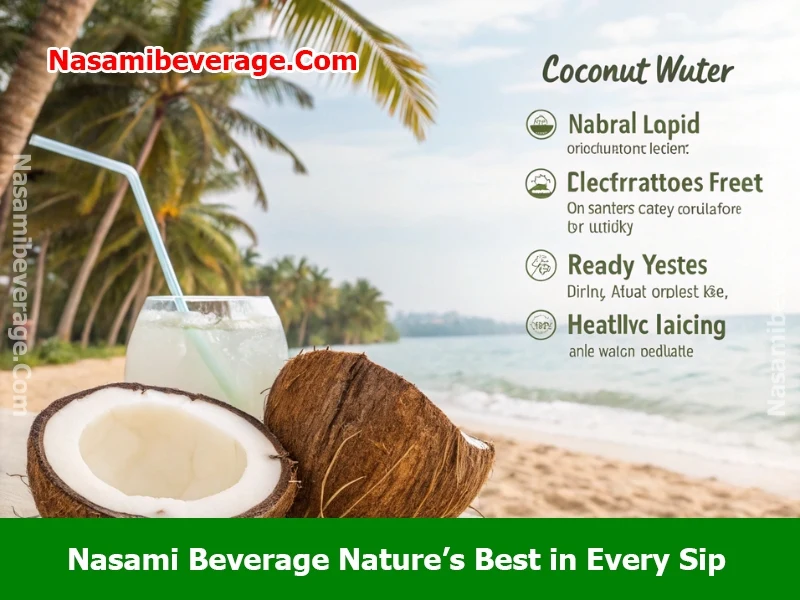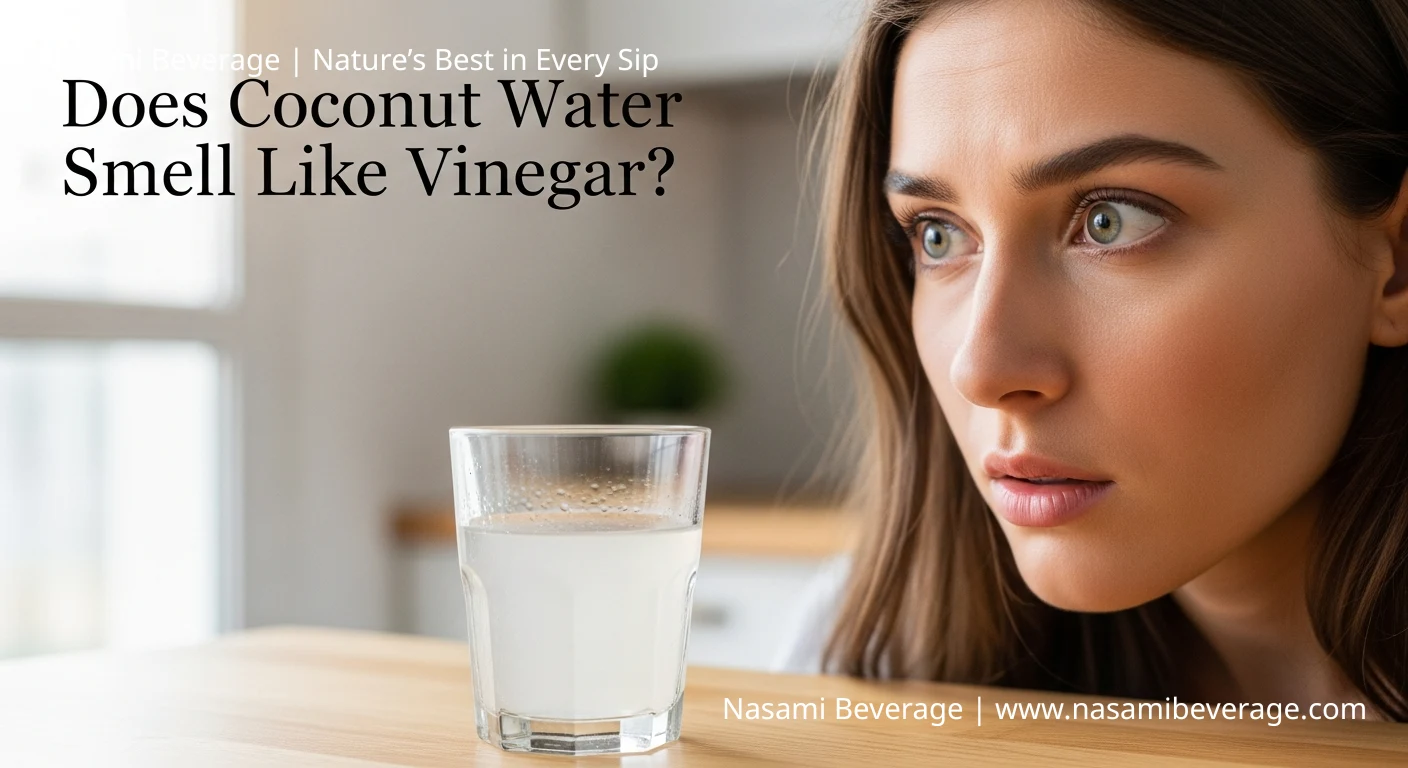What does coconut water taste like? It offers a mild, clean, and refreshing flavor with a subtle sweetness and a hint of natural saltiness, making it uniquely hydrating and gently nutty-like water infused with the essence of fresh coconut.
What does coconut water actually taste like?
At its core, pure coconut water has a mild, clean, and refreshing flavor. It is not an overpowering taste. Unlike other fruit juices, it is subtly sweet with a slightly nutty undertone. Imagine water that has been gently infused with the essence of a coconut.
Is coconut water sweet or salty?
One of the most distinctive aspects of coconut water is its unique blend of sweetness and a hint of saltiness. The mild sweetness comes from natural sugars, like glucose and fructose, that develop as the coconut matures. This is a gentle sweetness, far from the sugary punch of a soda or processed juice.

The subtle saltiness is thanks to its impressive electrolyte content. Rich in potassium, sodium, and magnesium, these minerals are behind many of the benefits of coconut water drinking. They contribute a slightly savory, almost saline, note that many find incredibly refreshing, especially after a workout.
The refreshing texture of natural coconut water
Do not confuse coconut water with its richer cousin, coconut milk. While coconut milk is thick, creamy, and fatty, coconut water is the opposite. It has a thin, light, and watery consistency, very similar to regular H2O. Its lack of a thick or creamy texture is precisely what makes it so hydrating and easy to drink.
For some, the unique flavor can be an acquired taste. If your first sip is surprising, try it chilled—most agree this is the best way to enjoy its clean, crisp profile.
Factors that change how coconut water tastes
Not all coconut water is created equal. The taste you experience can vary significantly depending on several key factors, from the coconut’s age to the container it comes in.
Fresh vs. Packaged – A world of difference
There is a distinct difference between drinking water straight from a coconut and pouring it from a package.

- Fresh from a Young, Green Coconut: This is coconut water in its purest form. The taste is at its sweetest and most vibrant, with a clean, pronounced nutty flavor. For those interested in the source, the complete guide to harvesting coconut water shows how this pristine liquid is collected.
- Water from a Mature, Brown Coconut: As a coconut ages, its water content decreases and the sugars begin to convert into the fat of the coconut meat. Water from these mature coconuts tends to be less sweet and can sometimes have a slightly bitter or more acidic aftertaste.
- Packaged (Bottled or Canned): Most coconut water sold in stores, like from popular brands Vita Coco or Zico, is pasteurized. This heating process extends shelf life but can slightly cook the natural sugars, which subtly alters the flavor, sometimes adding a toasted note.
Some brands, like Harmless Harvest, are famous for using a micro-filtration process instead of heat, which helps preserve a freshness flavor closer to the real thing.
This is also why their coconut water is often naturally pink from antioxidants interacting with light.
Why some coconut water tastes bad or sour
Your coconut water should never taste sour, vinegary, or be fizzy. If it does, it has gone bad. These tastes are clear signs that the liquid has begun to ferment and is spoiled.
Always check the expiration date on the package and refrigerate it after opening, consuming it within a day or two for the best and safest flavor.
Finding your perfect coconut water match
With so many options on the shelf, choosing the right one can feel overwhelming. The “best” brand often comes down to personal preference-whether you prefer a sweeter, nuttier, or more neutral taste.
Top coconut water brands known for great taste
Several brands have built a reputation for quality and flavor. When you are exploring, look for products that contain “100% coconut water” and have no added sugar or concentrates.

- Harmless Harvest: Often considered the gold standard for a taste that is closest to fresh. It is organic, unpasteurized, and famous for its crisp flavor and natural pink hue.
- Vita Coco: Widely available and known for its consistent, mildly sweet taste. A great entry point for first timers.
- Taste Nirvana: This brand is celebrated for its sweet, almost floral notes and is often sold in glass bottles, which many believe preserves the flavor better.
- C2O: Sources its coconuts from Thailand, known for producing an exceptionally sweet and fragrant variety.
- Zola: Another popular choice that offers a balanced, nutty flavor profile that is not too sweet.
Flavored vs. Unflavored – Exploring your options
If you find the natural taste of coconut water isn’t for you, don’t give up just yet. The market is full of flavored options that blend pure coconut water with fruit purees. Options like a refreshing coconut water lemonade can be a delicious gateway, offering hydrating benefits with a familiar, citrusy twist.
Ultimately, the journey to enjoying coconut water is one of discovery. From the vibrant taste of a fresh coconut to the convenience of a quality brand, there is a version out there for everyone. Serve it cold, and enjoy the refreshing, hydrating power of this incredible natural beverage.
Frequently asked questions
What should coconut water taste like?
Coconut water should have a mild, slightly sweet, and nutty flavor with a clean finish. It can sometimes have a subtle salty note from natural electrolytes. It should not be overpowering and should have a thin, watery consistency.
Does coconut water taste like coconut milk?
No, they taste very different. Coconut water is thin, light, and refreshing with a subtle sweet and nutty flavor. Coconut milk is thick, creamy, and rich with a much more potent, fatty coconut flavor, as it is made from the flesh of the coconut.
Why does my coconut water taste sour?
If your coconut water tastes sour, vinegary, or is fizzy, it has spoiled. These tastes indicate that the natural sugars have started to ferment. You should discard it immediately.
Is coconut water supposed to be sweet?
Coconut water is supposed to be mildly sweet. The sweetness comes from natural sugars found in the coconut. However, it is not intensely sweet like a typical fruit juice or soda. Brands that add sugar will taste much sweeter than those that are 100% coconut water.
Embracing the subtle harmony of coconut water’s natural sweetness, light nuttiness, and refreshing electrolyte balance reveals why it stands apart from other beverages.
Whether fresh from a young coconut or carefully chosen from trusted brands, its clean, hydrating profile offers a unique taste experience that’s both revitalizing and gentle.
Remember, the true essence of coconut water lies in its purity and natural composition, making it a wholesome choice for hydration and wellness.
Keep in mind that savoring coconut water chilled enhances its crispness, and selecting 100% pure options ensures you enjoy its authentic flavor without unwanted additives. This mindful approach transforms a simple drink into a nourishing ritual worth exploring.
Ready to discover your perfect coconut water? Share your favorite brands or flavors in the comments below and join the conversation on unlocking the full potential of this natural refreshment.



